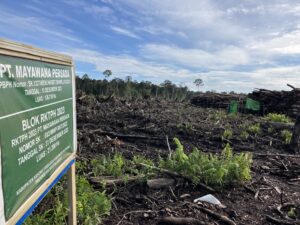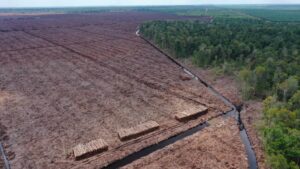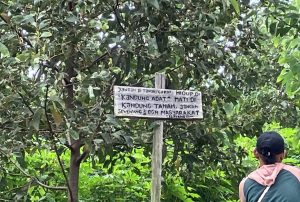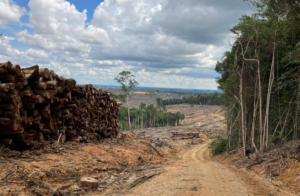【July 5th Seminar】Verified "Legal" Timber Products Coming from Orangutan Forest --- How Products from at-risk Landscapes Enter Japanese Markets
Rainforests in Indonesia and Malaysia have declined substantially in the last two decades as oil palm and timber concessions have been in biodiversity-rich lowland forests. This has had a detrimental impact on Indonesia and Malaysia’s biodiversity, particularly its populations of Critically Endangered orangutans. It has also resulted in degraded landscapes that suffer from seasonal fires and flooding.
To reduce the rate of deforestation, several industry initiatives have been launched. This has mainly been seen in the palm oil sector, where the uptake of No Deforestation, No Peat, No Exploitation (NDPE) policies has seen a greater emphasis placed on forest conservation, and the establishment of projects to conserve and restore forest areas. It is now estimated that 83% of refining capacity in Indonesia and Malaysia, where most of the world’s palm oil is refined and traded, is now covered by NDPE sourcing policies.
In the timber sectors, certification schemes like the Forest Stewardship Council are attempting to increase the sustainability of transparency of supply chains. Significant challenges remain, however, particularly in the pulp and paper sector. The Indonesian pulp and paper sector is dominated by the two large pulp and paper producers Asia Pulp & Paper (APP) and Asia Pacific Resources International Holdings (APRIL). APP and APRIL are parts of the Sinar Mas and Royal Golden Eagle (RGE) groups of companies, respectively. The Japanese company Marubeni Corporation also produces pulp in Indonesia, but to a lesser extent.
The three pulp producing companies in Indonesia have sustainability commitments that largely mirror palm oil refiners’ NDPE policies, with one main exception. Sinar Mas and RGE still allow the planting of industrial trees on unforested peatlands. Overall, the industrial tree plantation sector is not performing well in regard to sustainability commitments. Of the 21 largest oil palm growers in Indonesia, 16 are committed to NDPE policies. Meanwhile, of Indonesia’s 21 largest industrial tree growers, only Sinar Mas, RGE and Marubeni (PT Musi Hutan Persada) have sustainability commitments that are close to NDPE.
Despite these developments, timber and palm oil products linked to deforestation are still entering supply chains and ending up in shops. Many of these products are still being sold in Japan.
While Japan is not a grower of palm oil, Japan is the fourth largest financier of oil palm concessions, after Indonesia, Malaysia, and Singapore. Japan is also a major buyer of palm oil and timber products from Indonesia and Malaysia, with significant demand for plywood. Biomass policies also incentivise palm oil and wood products imports.
Analysis from international trade data found that between 2019-2021, Japanese companies imported around 600,000 tonnes of palm oil products from Indonesia, with some of the prominent buyers being Itochu, Fuji Oil, Mitsui, and MC Agri Alliance (a subsidiary of Mitsubishi Corporation). Many Japanese companies also buy plywood from Indonesia, with almost 550,000 tonnes of plywood exported between 2020 to 2021. Some of the largest plywood buyers from Japan are Sumitomo Forestry, Itochu, Sojitz Building Materials, SMB Kenzai, and Daiken Corporation. International trade data also shows that Japanese companies also import pulp from Indonesia, with Marubeni (PT Musi Hutan Persada) the most active in this sector.
【Date & Time】
16 to 18PM (JST), Friday, July 5th, 2024
【Venue】
Britt Memorial Hall, Sacred Heart Global Plaza
4-2-24 Hiro-o, Shibuya-ku, Tokyo [Google MAP]
Access
【Presentations (Hybrid on-site and online)】
Presentations by two guest speakers with consecutive interpretation (English-Japanese).
【Registration】"Click here to register" *Please select whether your participation will be in person or online.(ご参加が対面、オンラインのいずれかをご選択ください)
【Proposed Programme】
■ Introduction JATAN
■ Lecture outline by Sangga Bumi Lestari
Some of the most important orangutan habitat in Indonesia is found inside corporate concessions for the development of palm oil and pulp and paper. These concession operators can develop this habitat for agriculture and forestry purposes as long as their permits are approved by the government. Buyers that wish to have deforestation-free supply chains therefore need to conduct additional due-diligence on their suppliers that go beyond national legal reuirements. Sangga Bumi Lestari will demonstrate how deforestation-linked products enter Japanese markets and how timber buyers in Japan can ensure deforestation-free supply chains.
■ Question & Answer
Host: Japan Tropical Forest Action Network (JATAN)
Cooperation: Sacred Heart Institute for Sustainable Futures (SHISF), Global Environmental Forum (GEF), Mighty Earth
This seminar is subsidized by Patagonia Environmental Grants Program.
Speakers' Profile
Chris Wiggs
Chris is a primatologist with extensive experience in conserving key forest habitats in concession-dominated landscapes. Before joining AidEnvironment Asia in 2017, he worked for an orangutan conservation organisation in West Kalimantan, Indonesia, where his work focused on protecting orangutan habitat and other conservation areas inside oil palm plantations. As Executive Director of Sangga Bumi Lestari, Chris works with the Programme Director to manages day to day operations of the organisation and ensure a smooth implementation of all projects. He also contributes his expertise to projects to increase the sustainability performance of Indonesia’s forestry and agricultural sectors, and conserve, recover, and connect forests in Kalimantan.
Okita Miraningrum Nur Atsari
Okita has an educational background in industrial ecology. At Sangga Bumi Lestari, Okita coordinates research into the oil palm and timber sectors in Indonesia, and leads engagement with corporate companies and other key industry stakeholders. Her work focuses particularly on identifying companies that manage oil palm and forestry concessions, and mapping their forest landbanks, ownership structures, links to other companies, and supply chains. Okita also identifies significant trends in forestry and agricultural sectors, particularly how government regulations impact land-use in different sectors.
Contact
Please send a JATAN contact e-mail to info[α]jatan.org with the subject line “July 5th Seminar” and include your name and contact information. Please replace [α] with @ when sending.
【Seminar Movie】

Deforestation by PT Mayawana Persada 1 (Photo: JATAN)

Deforestation by PT Mayawana Persada 2 (Photo: WALHI)


